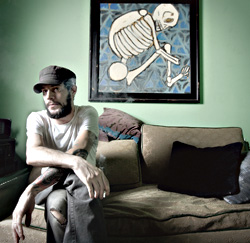The first thing that catches my eye when I walk into Mysterious Red X (MRX) studios is Neutral Milk Hotel‘s In the Aeroplane Over the Sea splayed out on the floor—not the album itself, but a dog-eared copy of the book from the fanatical 33 1/3 series detailing its recording. Producer, engineer, and MRX co-owner Ben Kersten is talking to Grand Archives frontman Mat Brooke about the placement of a triangle in the song they are working on for the band’s forthcoming Sub Pop debut. Brooke turns around in his chair to greet me and offer a beer, while Kersten gently taps a cigarette into a nearby ashtray and studies the console in front of him. A copy of Brian Eno‘s Here Come the Warm Jets sits on top of another piece of vintage equipment, a clustering that makes the scene look almost like a perfectly staged audiophile’s dream, but it’s clear from the flicker in Kersten’s striking, hazel eyes (and the dark circles underneath them) that everyone’s been working far too hard to toss about accessories for effect.
Over the last couple of years, Kersten has rapidly become a highly respected local producer and engineer whose list of credits reads like a roll call for the Northwest buzz bin: Blood Brothers, the Can’t See, Night Canopy, the Lights, Carissa’s Wierd, and Panda & Angel.
As with many young producers (Kersten is just 28), the artists he’s worked with praise his easygoing demeanor and open mind as assets, but listening to the lush and broad scope of his recordings and talking with more experienced musicians, it’s clear that his kaleidoscopic imagination and fearless approach to deconstruction is really the heart of what’s making him in demand behind the board.
“He has a very open mind when it comes to recording,” says Grand Archives drummer Curtis Hall.”Where a lot of producers tend to stick to traditional methods, Ben has a real experimental approach.We recorded a number of unconventional sounds…coconut shells, a pillowcase full of keys, a TV tray, a giant plastic water bottle, and [using] a violin bow on things like cymbals and a lap steel.We also used different recording techniques, such as recording outside, using different effects to tape, recording backwards and at different tape speeds, and recording using odd reflective surfaces. We referred to him in the studio as the “sixth Grand Archive,” like George Martin was the “fifth Beatle.”We pretty much consider him a member of the band.”
“He’s full of ideas, and he’s able to think about a band or instruments in a way that they’re not normally thought of,” agrees producer Eric Blood, who is part of the in-house recording team at MRX and is currently recording the Southern-rock-flavored sounds of local band the Moondoggies down at the Georgetown studio. “It’s brave to want to work that way. He’s always looking for a new sound from an old thing.”
After receiving a recording arts degree at a school in Florida, brief stints interning in the Seattle area at Bob Lang and Flying Rhino studios, and playing guitar with the criminally short-lived band eXBeSTFRIeNDS, Kersten made a detour to Los Angeles, landing a job at Cherokee Studios and the tutelage of legendary engineer Andy Johns (Rolling Stones, Led Zeppelin). “Andy Johns gave me some of the best advice I’ve ever gotten,” says Kersten. “He asked me if I ever recorded anything I thought sounded good. And I offered something along the lines of, ‘I think I’ve gotten some OK sounds here and there.’ He simply said, ‘Nope—you never have and you never will.’ He basically went on to tell me how he thinks the Led Zeppelin recordings sound like shit and how you’re always going to be your own worst critic. I guess I don’t know if that was a curse or a blessing, but ever since then, all I hear is the process. Sometimes it’s hard to enjoy because I can’t see the forest through the trees, but I understand that it’s a never-ending quest for the greatest sound that probably doesn’t really exist, except on Pet Sounds.”
As for career aspirations beyond recording bands at his lovingly maintained, analog-heavy studio, Kersten’s imagination could clearly take him into even more outer realms. “I’ve actually always wanted to do sound for cartoons, because they are so utterly outside the box. You can use a clarinet for the sound of someone walking. Cartoon sound effects are way more musical to me.”








